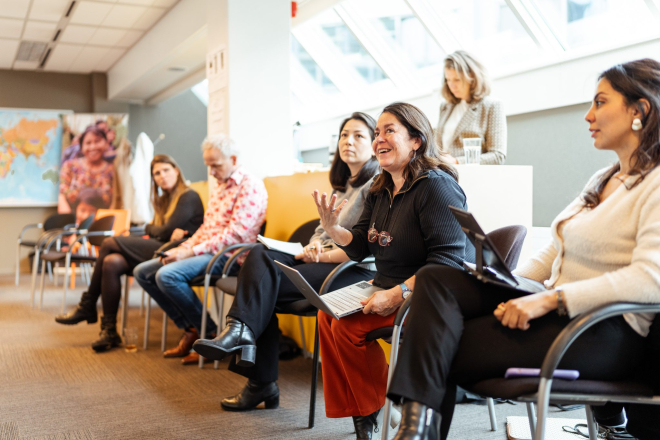Jamila Afghani, the president of WILPF Afghanistan (in exile) said that the Taliban takeover deeply impacted the women in Afghanistan when it comes to their access to education, their ability to make a livelihood as well as their ability to move. She noted that "when the Taliban took over, everything went back[wards] and now women and girls are imprisoned inside their homes, but they are as resistant as the mountains of Afghanistan, their struggle is going on underground, girls and women are building a movement underground…..darkness is not forever.” In their struggle, they have been joined by men with different views to those of the Taliban, male allies inside and outside the country who are supporting women’s rights while putting their lives at risk. Afghani shared her work engaging religious leaders, ulemas (Muslim scholars), and how she and WILPF Afghanistan have contributed to developing a different interpretation of the Quran among their communities.
Fatema Jafari, former member of Herat Provincial Council in Afghanistan and a current intern at PAX noted that Afghanistan is diverse and in this regard, communities experience militarised masculinities differently based on ethnicity, culture and language.
"When it comes to Hindu and Sikh women, they were forced to leave the country and were displaced due to their religion, Hazara women faced genocide and forced mass displacement, mass killing, and targeting due to their ethnicity and their religion. Tajik women face mass killing and forced mass displacement while Pashtun women experience militarised masculinity through honor killings as well as child and forced marriages. The Taliban are Pashtun, but this does not mean that Pashtun women enjoy their lives. All Afghan women from different ethnicities and religions are suffering due to militarised masculinities,” said Jafari.
Linda Al Obahi, a Senior Mediation and Liaison Officer at Peace Track Initiative (Yemen), shared her concerns about the restrictions on Yemeni women’s freedom of movement and freedom of expression: "We are receiving stories about restricting the movement of women between governorates and women are not allowed to leave the country. They are limiting the role of women to the production of more fighters and if they are courageous enough to speak up, they arrest members of their families.”
Al Obahi continued to note that women are absent from most of the governing structures in Yemen and restrictions on their movement and public participation would continue to sustain this status quo. She shared the work of PTI leading the drafting of a
Feminist Peace Roadmap and also their hopes to engage more Yemeni men from all walks of lives and political parties to support their feminist agenda in Yemen.
Concerns were raised as to whether the use of the framework of gender persecution could be perceived as an interference by Western governments, but the panelists indicated that support from external governments and feminist activists was crucial to advance their causes. Sometimes, they indicated, they have to send the messages and demands around women’s rights to their governments through external actors.
On this note,
Jafari added that there is a
Convention on Apartheid and in this regard, the Taliban have to be held accountable through international laws and through ensuring that aid conditionality takes gender persecution into consideration.
